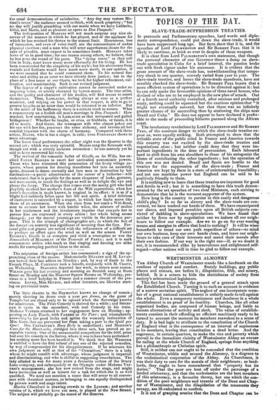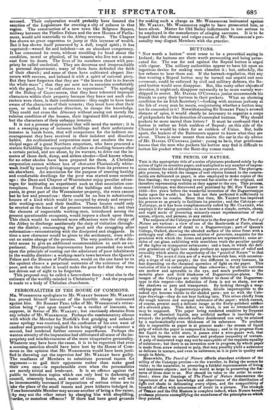WESTMINSTER ALMONRY
THE Abbey Church of Westminster stands like a landmark on the confines of squalor and comfort. Stately buildings, gay public places and statues, are before it ; dilapidation, filth, and misery, behind. It is a screen to hide the sluttishness of society from society's aristocratical legislators.
This fact has been made the ground of a general attack upon the Established Church. Turning it to such an account is evidence of a narrow sectarian spirit. The neglect of one incorporate mem- ber of a great national establishment is unfairly made to tell against the whole. Even a temporary remissness and deadness in a whole establishment is no proof of its inutility. Churches, like all other organized bodies, are composed of human beings, and liable to human alternations of activity and sloth. The value of establish- ments consists in their affording an efficient machinerjr ready to be turned to account the moment its members reawaken to a sense of duty. It is bad logic to attribute to the constitution of the Church of England what is the consequence of an interval of supineness in its members, leaving that constitution a dead letter. And the eagerness, in certain quarters, to make the vice and poverty which prevail in the immediate vicinity of Westminster Abbey an excuse for railing at the whole Church of England, springs from anything but a philanthropic or Christian spirit.
Still, it neither can nor ought to be concealed that the condition of Westminster, within and around the Almonry, is a disgrace to the ecclesiastical corporation of the Abbey. As Churchmen, it was their duty to care for the morals of their neighbours; as land- lords, they ought to have remembered that "property has its duties." That the poor are best off under the patronage of a landed aristocracy, and that the ecclesiastics are the best members . of this aristocracy, is a favourite theory, but one which the con- ; dition of the poor neighbours and tenants of the Dean and Chap- ter of Westminster, and the dilapidation of the tenements they occupy, are ill-calculated to confirm. It is not of grasping avarice that the Dean and Chapter can be accused. Their cooperation would probably have insured the sanction of the Legislature for erecting a city of palaces in that region. The construction of a new town like Belgrave Square, midway between the Pimlico Palace and the new Houses of Parlia- ment, would add materially to the Abbey revenues. The Chapter has shown no great eagerness to jump at this increase of wealth. But it has shown itself possessed by a dull, torpid spirit; it has vegetated—waxed fat and indolent—on an abundant competency. It has consumed its rents, without troubling its head about the condition, moral or physical, of its tenants who live not a stone- cast from its doors. The lives of its members cannot with pro- priety be called unclerical. They are decorous and irreproachable in personal deportment ; many of them have defended the faith of their church ; and some of them have cultivated elegant lite- rature with success, and imbued it with a spirit of rational piety. But they have forgotten that they are "the leaven that is to leaven the whole mass " ; that they are sent not to associate comfortably with the good, but " to call sinners to repentance." The apology of the Bishop of GLOUCESTER, that they have tolerated improper characters within their property because they knew not such cha- racters were there, is their condemnation : they ought to have been aware of the characters of their tenants; they must have shut their eyes, or walked in another direction, to escape the knowledge. They could not cross the Almonry without seeing not merely the ruinous condition of the houses, their ingrained filth and poverty, but the characters of their unhappy inmates.
It is not a process of ejectment that will mend the matter ; it is not a sweeping away of noisome buildings and their unfortunate inmates in harsh haste, that will compensate for the indirect en- couragement they have received in their indolent and dissolute habits. An ecclesiastical corporation must not emulate the mu- nicipal sages of a great Northern emporium, who have procured a statute forbidding the occupation of cellars as dwelling-houses after a certain period, and are about, by its warrant, to drive out the in- mates of those dark, damp, and airless abodes—God knows where, for no other abodes have been prepared for them. A Christian corporation cannot without loss of character Pharisaically white- wash itself by merely driving improper persons from its presence to sin elsewhere. An association for the purpose of erecting healthy and comfortable dwellings for the poor was started some months ago : the Dean and Chapter of Westminster enjoy peculiar advan- tages for instituting an experiment such as that association con- templates. From the character of the buildings and their occu- pants, in great part of the Westminster property, the rents cannot but be low and precarious : there could be no loss in substituting houses of a kind which would be occupied by steady and respect- able working-men and their families. These houses could only be erected as the leases of the present tenements fall in; and thus the element of respectable working-men, introduced among the present questionable occupants, would impose a check upon them. This check would be rendered more efficacious were the clergy of the Abbey to discharge assiduously the duty of visitation through- out the district ; encouraging the good and the struggling after reformation—remonstrating with the dissipated and sluggards. In time a new character would be given to the settlement, even with- out an entire change of the persons. The very position of the dis- trict seems to give an additional recommendation to such an ex- periment. Metropolitan improvements have proceeded too much upon the principle of rooting out the admixture of poor inhabitants in the wealthy districts: a working-man's town between the Queen's Palace and the Houses of Parliament, would on the one hand be to the opulent classes a perpetual memento of the existence of the poor, and on the other it would make the poor feel that they were not driven out of sight to be forgotten. This proposal may be called a benevolent fancy : what else in the estimate of the worldly-minded is Christianity ? And the proposal is made to a body of Christian churchmen.



























 Previous page
Previous page